Lesson 3 – Finding the Root
As I mentioned in the video, I have seen incredible success and momentum with people who listen to the Sara Brewer podcast episodes below. They are aimed specifically at those who are seeking to overcome pornography, but they have helped many others to overcome various habits:
- Episode 1 – Fixing the Root: Escape – Spotify, Apple Podcasts, or on Sara’s website.
- Episode 2 – Fixing the Root: Over-desire – Spotify, Apple Podcasts, or on Sara’s website.
- Episode 3 – Fixing the Root: Identity – Spotify, Apple Podcasts, or on Sara’s website.
In the video, I mentioned episodes 39 and 66 as well. We’ll return to those when we enter the practice portion of this course.
Key points from episodes 1-3 above:
- Episode 1 – Your likely using your habit as a buffer. A buffer is anything you use to escape negative emotions that has a net negative effect in your life.
- Episode 2 – Your mind has been conditioned to go to your habit after certain triggers. Like Pavlov’s dogs who salivated after a bell rang, your brain learns to call for satisfaction through your habit in certain circumstances. And, like his dogs, your brain can also unlearn it! You can hear the bell and not give in to your habit. But it’s going to take a certain kind of practice (see Chapter 2 of this course).
- Episode 3 – There is a part of you at your core (your spirit) that is completely untouched by the desire to act out your habit. As you remember your true identity, and change your limiting beliefs, you will automatically change and overcome your habit.

There is another major issue here that I came across in counseling with people about their habits, especially pornography. They often saw themselves as morally weak and impure people because of what they had done. But here is the key – if you have a negative habit embedded in your brain, and you are acting out that habit, it is not because you don’t have morals. It is because the survival part of your brain is overpowering the moral part of your brain.
The survival part of our brain can take control from the rational part of our brain. When this happens we act in ways that may surprise us. The apostle Paul acknowledged his own tendency in this regard, “what I would, that do I not; but what I hate, that do I” (Romans 7:15). Sometimes the flesh (or in this case, the midbrain) takes over, and we end up regretting our actions.
This is not to excuse actions that are hurting us or others, but to help us understand how to overcome them. We must learn to rewire our brains, so that the survival portion does not drag us into actions that our higher selves do not want to do.
If you want to overcome this, you are a moral person! You just need to do some work to give control back to the moral center of your brain. Here is a video from the Gospel Library that illustrates this:
This is one more reason to give yourself a break and have some self-compassion. If you find yourself with a habit that has robbed you of a sense of self-control, you are human. Your mind has learned to seek pleasure chemicals instead of facing emotional pain. And you can overcome this brain pattern.
This brings us to our next section, which will introduce practices that will help you rewire your brain and bring freedom and control back to your moral self.
“This is the most spiritual momentum I’ve ever had in my life! Including my mission.”

-Anonymous participant